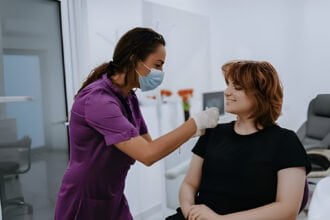Patient falls don’t just happen because of intrinsic risk factors like chronic illness or previous fall history. Most often, patient falls are caused by a multitude of factors:
- Patients do not call for nurse assistance
Disoriented or confused patients may not realize they are in an unfamiliar environment and may not use the nurse call button when exiting the bed. Similarly, prideful patients may choose not to use nurse assistance and will try to get out of bed themselves, despite their abilities.
When patients overestimate their abilities and do not call for help, falls can occur. Weak or disoriented patients may not be able to get out of bed safely, or may stumble when walking. Nurse assistance can minimize the occurrence of falls by transferring the patient or offering other assistance when needed.
Bed-exit alarms should be used when patients refuse to call for nurse assistance.
- The bed-exit alarm is not set
Reinstating the bed-exit alarm on a hospital bed can be a forgotten task in a busy hospital unit. When a nurse or staff member does not initiate or reactivate an alarm once the patient has returned to bed or after receiving bedside care, patients can be exposed to risk.
Bed-exit alarms help alert staff to bed-exiting behaviour in fall-risk patients such as getting out of bed or moving positioning. Patients who are prone to wandering or who exit the bed for reasons like incontinence may choose to exit the bed without assistance, which can result in trips or falls out of the bed or when ambulatory. Bed-exit alarms also alert staff to rolling or unwanted movement towards the edge of the hospital bed, which can occur in limited mobility patients, and cause a patient to fall.
When a bed-exit alarm is not reset, a patient’s exit from bed or repositioning can go unnoticed and result in trips or falls. Preventative measures like bed-exit alarms can ensure that patients are assisted out of bed or are repositioned when they are too close to the edge of the hospital bed.
Bed-exit alarms that automatically restore settings should be used when monitoring patients.
- The patient is on high-risk medications
High-risk medications including sedatives and anti-depressants significantly increase a patient’s risk of falling. Dizziness, confusion, or impaired mobility can occur as a result of medication, and because of the numerous effects, patients on high-risk medications commonly experience falls.
Patients on high-risk medications should be assessed at the highest fall risk. Preventative measures include using adjustable low hospital beds, bed-exit alarms, and scheduled toileting can help reduce the occurrence of medicated patient falls.
- The patient assessment was inadequate
Sometimes a patient may not be assessed for fall risk on intake. In other instances, a patient may be assessed for a low fall risk, when in reality; a patient may be overestimating his ability or may be experiencing incontinence.
As a result, the patient may not be identified as a fall risk and does not benefit from the hospital’s preventative measures for patient falls. This increases the likelihood of falling, as the unidentified fall risk patient is not placed in a low hospital bed, not given non-slip footwear, nor is he moved closer to the nurses station for toileting assistance – common preventative measures for fall risk patients.
As a preventative measure, low hospital beds are recommended for use with all acute care patients to minimize falls and fall injury. Fall risk assessment should be routinely performed in order to address changes in a patient’s condition throughout the patient care.
- There was a delayed response to the nurse call bell
Incontinent or agitated patients may not be willing to wait for a nurse’s response to the call bell. Instead, these patients may attempt to leave the bed, wander, or use the bathroom unassisted. Much like the patients who refuse to use nurse call assistance, these impatient patients are at a greater risk of falls because they are unassisted when exiting the hospital bed.
Highly agitated or incontinent patients should be moved to closer to the nurses’ station in order to minimize the wait time for nurse assistance. Bed-exit alarms should also be used to alert nurses to patients exiting the bed.









